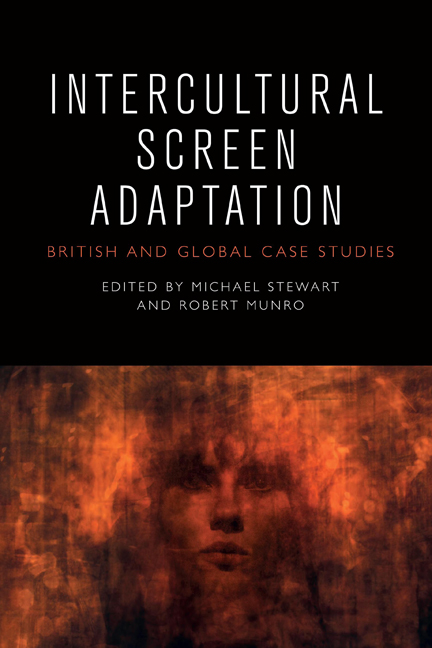Book contents
- Frontmatter
- Contents
- List of Illustrations
- Acknowledgements
- List of Contributors
- Introduction
- PART I NOSTALGIA, HERITAGE AND THE TOURIST GAZE
- 1 Adapting Pagnol and Provence
- 2 ‘A Tourist in Your Own Youth’: Spatialised Nostalgia in T2: Trainspotting
- 3 ‘200 Miles Outside London’: The Tourist Gaze of Far from the Madding Crowd
- PART II RADICAL CONTINGENCIES: NEGLECTED FIGURES AND TEXTS
- 4 Reframing Performance: The British New Wave on Stage and Screen
- 5 Why We Do Not Adapt Jean Rhys
- PART III RE-ENVISIONING THE NATIONAL IMAGINARY
- 6 ‘To see oursels as ithers see us’: Textual, Individual and National Other-selves in Under the Skin
- 7 Back to the Future: Recalcitrance and Fidelity in Julieta
- PART IV THE LOCAL, THE GLOBAL AND THE COSMOPOLITAN
- 8 El Patrón Del Mal: A National Adaptation and Narcos Precedent
- 9 Constructing Nationhood in a Transnational Context: BBC’s 2016 War and Peace
- 10 The Beautiful Lie: Radical Recalibration and Nationhood
- PART V REMAKING, TRANSLATING: DIALOGUES ACROSS BORDERS
- 11 In Another Time and Place: Translating Gothic Romance in The Handmaiden
- 12 Chains of Adaptation: From D’entre les morts to Vertigo, La Jetée and Twelve Monkeys
- 13 A ‘Double Take’ on the Nation(al) in the Dutch-Flemish Monolingual Film Remake
- Index
11 - In Another Time and Place: Translating Gothic Romance in The Handmaiden
Published online by Cambridge University Press: 22 September 2020
- Frontmatter
- Contents
- List of Illustrations
- Acknowledgements
- List of Contributors
- Introduction
- PART I NOSTALGIA, HERITAGE AND THE TOURIST GAZE
- 1 Adapting Pagnol and Provence
- 2 ‘A Tourist in Your Own Youth’: Spatialised Nostalgia in T2: Trainspotting
- 3 ‘200 Miles Outside London’: The Tourist Gaze of Far from the Madding Crowd
- PART II RADICAL CONTINGENCIES: NEGLECTED FIGURES AND TEXTS
- 4 Reframing Performance: The British New Wave on Stage and Screen
- 5 Why We Do Not Adapt Jean Rhys
- PART III RE-ENVISIONING THE NATIONAL IMAGINARY
- 6 ‘To see oursels as ithers see us’: Textual, Individual and National Other-selves in Under the Skin
- 7 Back to the Future: Recalcitrance and Fidelity in Julieta
- PART IV THE LOCAL, THE GLOBAL AND THE COSMOPOLITAN
- 8 El Patrón Del Mal: A National Adaptation and Narcos Precedent
- 9 Constructing Nationhood in a Transnational Context: BBC’s 2016 War and Peace
- 10 The Beautiful Lie: Radical Recalibration and Nationhood
- PART V REMAKING, TRANSLATING: DIALOGUES ACROSS BORDERS
- 11 In Another Time and Place: Translating Gothic Romance in The Handmaiden
- 12 Chains of Adaptation: From D’entre les morts to Vertigo, La Jetée and Twelve Monkeys
- 13 A ‘Double Take’ on the Nation(al) in the Dutch-Flemish Monolingual Film Remake
- Index
Summary
The Handmaiden (Ah-ga-ssi/아가씨, 2016) is the tenth feature film by the South Korean director Park Chan-wook, who is mainly known for his highly stylised and visceral tales of vengeance that include the Cannes Film Festival prizewinner Oldboy (Oldeuboi 2003). An eagerly awaited film since his English language thriller Stoker (2013), The Handmaiden was very much promoted worldwide as the work of Park Chan-wook, an acclaimed international auteur. ‘From the director of Oldboy and Stoker’ is indeed the top line that adorns the film's UK theatrical poster. Upon its international release, the film garnered critical and commercial success. Among its many accolades, the film was in competition for the Palme d‘Or at the 2016 Cannes Film Festival, and won the 2018 BAFTA (British Academy of Film and Television Arts) Award for Best Film Not in the English Language. According to the 2016 Korean Cinema Yearbook, it was also ‘sold to a record 175 territories (besting the previous high of 167 for Bong Joon-ho's 2013 feature Snowpiercer)’, and reportedly grossed over US$37.7 million (Paquet 2016: 7).
In the UK, The Handmaiden enjoyed a particularly successful release. Over the first six weeks of play, its gross reached £1.25 million and it became the best-performing Korean film at the box office by a wide margin, beating Park‘s own Oldboy at £316,000 (Gant 2017: 9). As Charles Gant points out in his Sight & Sound report, ‘that's a remarkable result’, considering the relatively poor box office track record of Korean films as well as the fact that foreign language films rarely hit £1 million in the UK market. Then again, as Gant puts it, ‘The Handmaiden offered an altogether different proposition for UK audiences’, and one of the salient aspects for its UK distributor Curzon Artificial Eye was the film's ‘connection to Sarah Waters’ novel Fingersmith’ (2002: 9). Indeed, to all intents and purposes, The Handmaiden is an adaptation of British writer Waters’ third novel Fingersmith, even though the film transports a gothic tale of crime set in nineteenth-century England to Korea of the 1930s when the Korean peninsula was under Japanese occupation. Furthermore, notwithstanding the cultural relocation, The Handmaiden is in steadfast and evident dialogue with Fingersmith, and it is this inter-medial relationship between the original novel and the film adaptation that is the main concern of this article.
- Type
- Chapter
- Information
- Intercultural Screen AdaptationBritish and Global Case Studies, pp. 191 - 205Publisher: Edinburgh University PressPrint publication year: 2020



